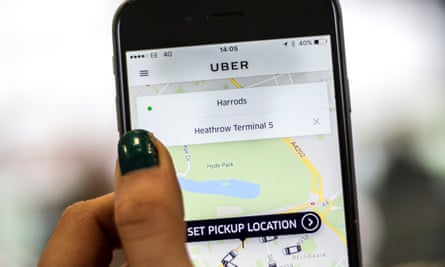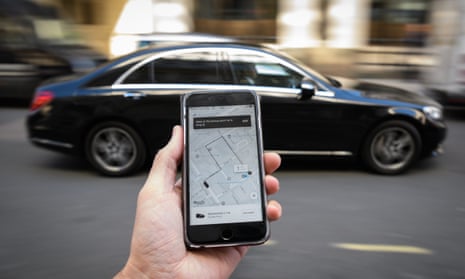The ride-hailing firm Uber has lost its appeal against a ruling that its drivers should be classed as workers with minimum-wage rights, in a case that could have major ramifications for labour rights in the growing gig economy.
The US company, which claims that drivers are self-employed, said it would launch a further appeal against the Employment Appeal Tribunal decision, meaning the case could end up in thesupreme court next year.
Drivers James Farrar and Yaseen Aslam won an employment tribunal case last year after arguing they should be classified as workers, citing Uber’s control over their working conditions.
Uber challenged the ruling at the tribunal in central London, warning that it could deprive riders of the “personal flexibility they value”. It claims that the majority of its drivers prefer their existing employment status.
The Independent Workers’ Union of Great Britain (IWGB), which backed the appeal, said drivers will still be able to enjoy the freedoms of self-employment – such as flexibility in choosing shifts – even if they have worker status.
The union said the decision showed companies in the gig economy – which involves people on flexible working patterns with irregular shifts and minimal employment rights – have been choosing to “deprive workers of their rights”.
Farrar said: “It is time for the mayor of London, Transport for London and the transport secretary to step up and use their leverage to defend worker rights rather than turn a blind eye to sweatshop conditions.”

“If Uber are successful in having this business model, obliterating industrial relations as we know them in the UK, then I can guarantee you on every high street, in retail, fast food, any industry you like, the same thing will go on.”
Farrar said he was willing to fight the case all the way to the supreme court if necessary but called on Uber’s new chief executive, Dara Khosrowshahi, to intervene instead.
“We’ve asked to meet him when he came to London and Uber declined to do that, which tells you everything.”
Aslam said: “Today is a good day for workers, we made history. The judge confirmed that Uber is unlawfully denying our rights.”
“It’s about making sure workers across the UK are protected. Companies are hiding behind technology, bogusly classifying people as self-employed so they can get away from paying minimum wage. That can’t be allowed to happen.”
Uber said it would continue to challenge the decision through the courts but had yet to decide whether to apply to leapfrog the court of appeal and go straight to the supreme court.
It could theoretically hitch its case to the supreme court labour rights battles involving courier firm CitySprint and Pimlico Plumbers, due to be heard next year.
The legal tussle could also be superceded by political events, as the government considers tweaking employment law following a review by former Tony Blair adviser Matthew Taylor.

Tom Elvidge, Uber UK’s acting general manager, said: “Almost all taxi and private hire drivers have been self-employed for decades, long before our app existed.
“The tribunal relies on the assertion that drivers are required to take 80% of trips sent to them when logged into the app. As drivers who use Uber know, this has never been the case in the UK.
“Over the last year we have made a number of changes to our app to give drivers even more control. We’ve also invested in things like access to illness and injury cover and we’ll keep introducing changes to make driving with Uber even better.”
The tribunal ruling is the latest in a series of legal challenges affecting the “gig economy”, with implications for the future of labour rights in the UK.
The Labour MP Jack Dromey said: “No British worker should be denied basic employment rights which we have worked so hard to secure.
“Uber is a 21st-century company behaving like a 19th-century mill owner, when workers had no rights. It is now up to Uber to change its employment practices and grant its drivers the rights they deserve and are entitled to in law.”
Frances O’Grady, the TUC general secretary, said: “This ruling should put gig economy employers on notice. Unions will expose nasty schemes that try and cheat workers out of the minimum wage and holiday pay. Sham self-employment exploits people and scams the taxman.”

Comments (…)
Sign in or create your Guardian account to join the discussion